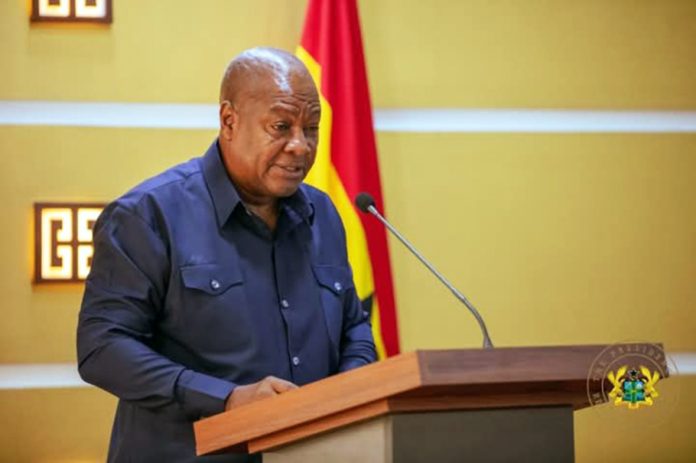President John Dramani Mahama has described Ghana’s recent economic performance as a monumental achievement, attributing the progress to fiscal discipline, prudent expenditure and reforms that have helped the country survive without reliance on external borrowing.
Addressing journalists at a media briefing held at the Jubilee House on Wednesday, the President expressed satisfaction with the reforms undertaken by his administration.
“We are quite happy with the outcomes of the reforms we have been able to implement in the economy.
“We have survived without going to the capital market; we survived without borrowing externally. Who would have thought some years ago that Ghana could run without external loans and yet we have survived?” he said.
President Mahama explained that government had focused on reordering expenditure and channelling resources into priority areas of the economy.
“All we have done is to prioritise expenditure and push funds to critical sectors. Fiscal discipline, avoiding wasteful political spending, is already showing success in the market,” he emphasised.
Fiscal Indicators and Primary Balance
Delving into the fiscal space, the President disclosed that Ghana’s primary balance had significantly improved.
“We have moved from a negative 3.5 primary balance to a positive 1.1 and by the end of the year, we expect to achieve 1.5. This is a clear indication that fiscal consolidation is working.”
President Mahama insisted that he would not favour a quick return to the international capital market.
“We must consolidate the economy before looking at external financing,” he said, stressing that maintaining discipline in expenditure was the only way to ensure sustainable growth.
Cedi Performance and Forex Challenges
The state of the Ghanaian Cedi also featured prominently in the two-hour media encounter. John Mahama admitted the local currency had come under pressure, though recent reforms had triggered a steep appreciation.
“We recognised a very sharp appreciation in the value of the cedi in response to reforms. It was undervalued at 16 and probably overvalued at 10. Somewhere in between lies its true value. The key is to stop rapid depreciation.”
He warned that steep fluctuations disrupt planning, recalling how the cedi depreciated by 25% in the first half of 2024.
According to him, although the Bank of Ghana had intervened in the forex market, it withdrew after rapid appreciation spurred increased imports.
“This appreciation created challenges for exporters who struggled to access dollars. Every country tries to find a balance where exporters can thrive while importers are not overburdened by high forex rates. Where that balance lies I cannot say, but the cedi is making an adjustment,” he noted.
President Mahama projected that the Cedi would stabilise within a controlled margin. “We will ensure that any depreciation remains within 5% annually. That is our target,” he said.
He also revealed that speculation had led to a 50% drop in remittances from the Diaspora, as many deferred transfers, anticipating currency readjustments.
Forex Leakages and Transfer Irregularities
President Mahama raised red flags about malpractice in the forex system, noting that some transfer companies were hoarding dollars abroad, while others failed to repatriate funds.
“There were cases where commercial banks released foreign exchange for imports, but the goods never came. Over the past four years, about $42 billion left this country without corresponding imports.
“The Bank of Ghana has sanctioned some banks, and soon we will interrogate individuals involved,” he disclosed.
The President stressed that protecting the cedi was essential for investor confidence and economic stability.
“A strong cedi benefits all of us, but when people exploit the system, we must act decisively,” he said.
U.S. Tariffs and Trade Diversification
On international trade, Mahama said U.S. tariffs had forced Ghana to explore new markets, particularly China.
“With China offering zero tariffs, we must identify products where we have comparative advantage. China imports huge volumes of agricultural products such as maize and meat from the U.S. If we expand agricultural production, we can position ourselves to take advantage of this new demand,” he argued.
He, however, cautioned that no country wins in a tariff war. “The U.S. has disrupted a rules-based trading system built over decades. Even Ghana has been slapped with a 15% tariff, effectively crippling AGOA. With this, renewal is almost impossible unless Congress intervenes,” President Mahama told the journalists.
Reflecting on America’s global influence, he said “For years, the U.S. gained admiration in Africa through concessions like zero tariffs and developmental assistance. But President Trump’s transactional approach has reversed much of that goodwill.”
He explained that the legality of Trump’s tariffs was under review in the U.S. Supreme Court, and the outcome would determine whether the tariffs stand or require congressional endorsement.
Consolidation before Expansion
President Mahama stressed that Ghana’s economic strategy would continue to focus on fiscal discipline, controlled expenditure and stabilisation of the cedi before re-engaging with international capital markets.
“While we work to strengthen the economy and attract investors, we must protect the cedi and ensure discipline in spending. That is the surest way to consolidate our gains and safeguard the future of Ghana,” the President affirmed.








